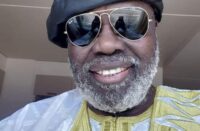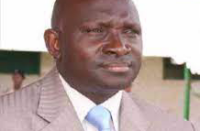
Article 19’s Fatou Jagne Senghore Speaks Out
Following the repressive events of April 14th and 17th when one Gambian opposition party leader was tortured to death and nearly all the executive members of the party were arrested and taken to court to be slammed seven charges related to peaceful protest march. “…..The Gambian-born Director of the Dakar-based West Africa Office of the human rights organization, Article 19, Fatou Jagne-Senghore, who together with human rights activist in the late 1990s and early 2000 with the likes of Mrs. Mary Small, Mrs. Adelaide Sosseh, Lawyer Emmanuel Joof, Lawyer Ba Tambedu, Mohammed Lamin Sillah and others founded the defunct Gambia Human Rights Defenders.
Mrs Fatou Jagne Senghore recently granted an interview to the Senegalese on-line publication, Seneweb’s Youssouf SANE”
Asked of her opinion about what she thought of the current political situation in the Gambia, Mrs. Jagne-Sengore said the situation is alarming. She said the killing of UDP leader, Solo Sandeng, the bloody repression of peaceful demonstrators, many of them women, has been the praxis for the past twenty-two years.
She continued, saying that the dispensation that prevails in the tiny West African country is, “authoritarian with an autocratic ruler who grips the country with an iron hand with an insidious repression. Repression of all dissenting voices including those critical journalists and opponents is the order of the day. Repression through laws and regulations of questionable legitimacy. A servo justice orders, which is only there to endorse the decisions of the autocratic regime. A state-orchestrated violence with security forces acting illegally and with impunity against citizens. Citizens are regularly disappeared in this small country. Nobody knows where they are. Of unsolved killings and imprisonment without trial. People are trapped in structures that only the government and its repressive apparatus know. For there is a system of parallel paramilitary terror orchestrated by the NIA.
What is the role of the secret services in the Jammeh dictatorship?
In Gambia, the secret services play the role of the political police who kidnap people at home at night – hooded like criminals – who through atrocious acts imprison them in places outside official detention centers and torture them to death. So that’s part of the very repressive and very alarming system that exists in Gambia that keeps Gambians living in fear. As soon as you speak, as soon as you express dissenting views, the repressive machine falls on you. Whenever there was uplift inclination is repressed in blood. Student youth rioted in 2000 and they were repressed in blood: 14 students were killed, dozens injured, some still live with their disabilities. Investigations by a commission of enquiry set up after that massacre absolved the state and its staff of all responsibility. The state even went on to institute a constitutionally proscribed impunity for the police and soldiers responsible for the heinous massacre.
Opponents simply asking for reforms have been killed. Is that acceptable today?
It is unacceptable that a political actor is killed and brutalized in this way because
it needs reforms and discussions. This is also another side of the regime we see: intolerance to the extreme. The scheme has proved to the world gradually. Things happened in secret, but for some time, this plan said that nothing can stop it. Kill someone because they demand reforms, it is something that we cannot accept in this world. We need this regime for its actions. We, in our organization, we have been able to document, for 21 years, all these atrocities. We shared with the human rights institutions at regional and international level and we will continue. We need the Jammeh regime to be stopped before it is too late. He illegally executed few years ago, 9 people. And to this day, nobody knows where they are buried. This is new!
What have you listed in your documents?
We were able to identify among other hundreds of cases of serious violations (murder, torture, forced disappearance, imprisonment, looting and attacks against the press, arrests of suspected families “traitors” sexual assaults against inmates …). There are cases that are still pending. You know when people disappear, often has traces. But once again, there are many families who cannot speak because of fear of reprisals. However, for some time, families demonstrate with clear proofs. And there are people who can put names to faces and say that a particular person was involved in the kidnapping came home at night, they had a car that color, etc. And with the digital age, more and more people trying to take pictures and pictures to keep and share with human rights organizations. We are cautious in our documentation, because we want that every time we have data, we can prove them. Many people have left the country because of oppression. The state of things in the country stifles you politically, economically and socially; it suffocates you. All the laws are set against you.
Gambians are demonstrating openly and continuously. This was not the case before. In your opinion, is this the beginning of the end of this regime?
We hope so. A regime that has been brutalizing its people for more than 21 years, is a regime without any legitimacy. And I think today, the government has reached its limits. It has no legitimacy. A worthy government must create the framework so that people can flourish and not the opposite. Today, one can really say that this is the beginning of the end, the myth has fallen, fear begins to fade and change sides. The resistance is not yet well organized, but people are starting to brave the abuse, people felt it was too much. Some sections of society have started out on the streets and women are at the forefront. Otherwise, history will tell. Once the people are exasperated, nothing stops them. But we fear the worst with the brutality on protesters. We ask that everyone be vigilant. For there is a good chance that, if people continue to protest, the authorities will resort to even more severe forms of repression.
What fate is reserved for the women arrested in connection with the protests?
We are very concerned about the fate of women who were severely repressed in atrocious conditions. We received very overwhelming evidence that concern over the abuse and bodily integrity of women prisoners allegedly suffered in detention centers and we alert international opinion for increased vigilance on what happens. Because we fear that there is more atrocities to simply suppress definitively these voices there. And when trying to use sexual violence against women as a weapon of repression and to silence it becomes serious.
What must Senegal and Ecowas do with such a situation?
Show that in our sub-region, we try to have common values. States aspiring to consolidate the rule of law. Upon consolidation of respect for fundamental human rights. Today we have a country which is known for the brutality, which flouts all the rules that bind the countries of the sub-region. It is necessary that the countries of the sub-region, in a concerted and united manner, put pressure on the Gambian government to stop these atrocities. The Gambian regime cannot continue to kill people in broad daylight to commit human rights violations, torture, rape of women in custody with total impunity and everyone is silent in this sub-region. It is unacceptable! ECOWAS has tentatively set the tone, but you need more commitments of Member States. We hope that important decisions will be taken at the next summit of ECOWAS. It is true that every people must fight for its own destiny, but I think in the sub-region should not accept in silence certain atrocities and violence against citizens and say that we are in a community.
The government there does not respect human rights, but yet Gambia is the headquarters of the African Commission on Human Rights and Peoples. Is not this a contradiction?
The seat was there since the late eighties. This also shows that in Africa we do not take seriously the issue of human rights at the political level. Today, the commission is there, forgotten in Banjul. It meets every six months, but the states themselves are not genuinely interested. One has the impression that deliberately, the authorities do not care a bit. They make fun of the decisions of this commission. Yet this is a commission that did an outstanding job. But all the work of this commission was discredited because of its headquarters and non-cooperation of many member states, particularly that of Gambia though the Gambian state wants the Commission’s headquarters to remain there because of the prestige and camouflage it provides.
But does the Jammeh regime respect the resolutions of this commission?
Beyond the logistical aspects, Gambia does not respect the decisions of the commission. And the commission knows this and must on its own initiative to relocate since it cannot be in a country that violates the charter every day. This is one of the most repressive countries in the continent. Yet today the Gambia continues to host the African Commission on Human Rights and Peoples. She does not care even if it does not respect the resolutions of the board. Gambia has not submitted a report since 1994. It denies that the commissioners go there to know what is really going on.
What feedback have you trial the opponent Ousainou Darboe?
This is a political trial. An opposition leader marched peacefully to manifest his anger over the cold-blooded murder of a colleague and who has been in detention since 16th April 2016. It is a trial that does not respect the rules of a fair trial where the importance of mobilization. Moreover, the judge recused himself after the unfortunate statements in the media. Because I think that it is the pressure of the street that will make the difference. It will not happen in court. We ask that he be released with his supporters and that light be shed on the death of Solo Sandeng. We ask that light be shed on these cases and that the regime could account for its atrocities.
Your last word?
We request that the international community to do more in helping Gambia to restore democracy and the rule of law. That the Gambian people be supported so that finally this regime cannot continue to kill, torture and resort to other excesses against its people with impunity. We welcome all voices that are raised against what is happening in Gambia at regional and international level and especially those of some parliamentarians, policy makers and people of Senegal. The European Parliament resolution which calls on EU states to consider targeted sanctions including travel bans to the perpetrators of atrocities are important measures. Today, we must support the people in this quest for freedom and support morally to end this violent repression.
The end
Translated from the French and presented by Kaironews. All errors ours.


Hooded like criminals! It is indeed a gang without legitimacy. Hat’s off for Mrs Jagne for nailing it to the point.
Thank you Kairo for the effort in translating the interview. We are all together in this.